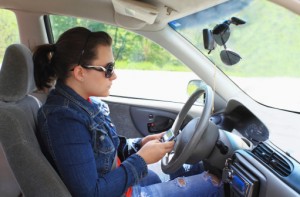Teen Driving Behavior Shows Poor Understanding of Risk

Teens say they are aware of the dangers of texting or drinking while driving. But what they do behind the wheel tells a different story. A recent survey by Liberty Mutual Insurance and SADD (Students Against Destructive Decisions) finds “a sharp disconnect” between what teen drivers know and how they behave when it comes to drinking or texting.
According to the survey, 96% of teen drivers know that using a cellphone while driving is distracting. Yet 68% admitted to using a cellphone to read or text behind the wheel, and 86% said that they talked on the phone while driving.
Moreover, 86% of the teens surveyed said they consider driving under the influence to be extremely or very distracting. Yet one in 10 who said they never drive under the influence also said they occasionally drive after having an alcoholic beverage.
Distraction Awareness
Oklahoma prohibits drivers with learner’s permits or intermediate licenses from texting or using a handheld device behind the wheel. And the National Highway Traffic Safety Administration, the Federal Motor Carrier Safety Administration and many advocacy groups have worked to raise awareness of the dangers of distracted driving.
But it appears that for teens, these efforts are not enough. At least 21% of teenage drivers who die in distraction-related traffic collisions were using a cellphone at the time of the fatal crash.
According to a recent survey by the AAA Foundation for Traffic Safety, 80% of drivers say distraction is a problem. More than 3,300 people died in 2012 in wrecks caused by distracted drivers, according to the federal Department of Transportation. And some experts believe that cellphone-related traffic deaths are underreported.
Teen Drinking
As for drinking, drivers under age 21 are prohibited from having any detectable level of alcohol in their blood. Nonetheless, alcohol-impaired drivers under the age of 21 are involved in more than 23% of fatal traffic accidents in Oklahoma.
While most teens do not drink, some make destructive decisions related to drugs and alcohol.
The Liberty Mutual survey suggests some teens may have problems understanding intoxication and impairment. For example, of those surveyed, 21% said that a designated driver is someone who is “basically sober,” not someone who has avoided all intoxicants in order to be entirely safe to drive.
Ultimately, parents need to work closely with teen drivers to make sure they understand that even a single drink is too much and that even one text behind the wheel is dangerous. A little effort and a consistent message can help save lives among Oklahoma kids and those who share the road with them.
Blog CATEGORIES
Let's Talk About It
Speak with an experienced attorney at no cost to you

